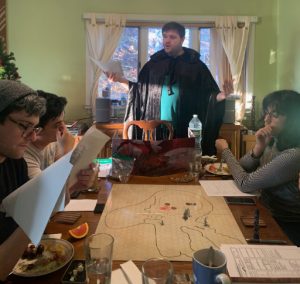Contact Professor Lella
Office
Biological Sciences (Bldg. #21)Room 207Dr. Gregory Lella (he/him)
About Me:
 Hello! I’m Professor Gregory Lella, a specialist in Twentieth Century U.S. History. I study the intersections of criminal justice and immigration in the age of mass incarceration. In other words, “crimmigration.” I earned my PhD at Stony Brook University in my home state of New York. My dissertation, “Fear in the Desert: Police Violence, Deportation, and Resistance in the Arizona Borderlands, 1964 to the Present,” explores the history of police violence, including the Border Patrol, in twentieth-century Arizona. I’m very excited to teach at NAU and to continue my research on the history of crimmigration in Arizona!
Hello! I’m Professor Gregory Lella, a specialist in Twentieth Century U.S. History. I study the intersections of criminal justice and immigration in the age of mass incarceration. In other words, “crimmigration.” I earned my PhD at Stony Brook University in my home state of New York. My dissertation, “Fear in the Desert: Police Violence, Deportation, and Resistance in the Arizona Borderlands, 1964 to the Present,” explores the history of police violence, including the Border Patrol, in twentieth-century Arizona. I’m very excited to teach at NAU and to continue my research on the history of crimmigration in Arizona!
New Classes from Professor Lella! Accordion Closed
Starting Fall 2024, I’m offering HIS 278, a new course on the history of Crime and Punishment in the United States! I’m teaching a comparable high-level seminar, HIS 468, which focuses on the historiography and intellectual history of policing and imprisonment. Starting Fall 2025, I’ll also be teaching HIS 374, a new course I’ve designed on Civil Rights and Black Power in the United States!
Whats your favorite class to teach? Accordion Closed
That’s a difficult question! So far my favorite class to teach has been HIS 300W, a course about how to write research essays in history. I enjoyed it because I was also working on my own publication at the time, so I benefited almost as much from the discussions as my students did. I also love teaching HIS 468, a seminar class with open topics. I use it as a “mini-grad seminar,” designed to demonstrate what a grad course is like to advanced undergrads. So far, students seem to love the format! And of course, I also love teaching HIS 192–the U.S. History II survey!
What have you been up to lately? Accordion Closed
Since coming to NAU, I’ve been working on articles for an edited collection on Indigenous Borderlands History and for the peer reviewed Western Historical Quarterly. The former addresses how Indigenous sovereignty and politics of territorial integrity intersect with border abolitionism. The latter investigates the Maricopa County Organizing Project’s (MCOP) successful attempts to organize undocumented Arizonan farmworkers in the 1970s and 1980s. MCOP’s story is a fascinating, and surprising, tale of victory over both police repression and grower obstinacy in a time traditionally discussed in terms of the decline of organized labor.
What’s next for you? Accordion Closed
Right now, I’m working on a proposal for a new book. Based on my dissertation, the book Fear in the Desert: Policing Latinx and Indigenous People in the Arizona-Mexico Borderlands, 1964 to the Present, will explore the history of police violence in late twentieth-century Arizona. Latinx and Indigenous carceral history has been severely understudied by scholars. While historians have thoroughly examined mass incarceration and militarized policing in urban Black communities and Latinx communities in Texas and California, the past decade—including the conviction and presidential pardon of Maricopa County Sheriff Joe Arpaio—reminds us that Southwestern Latinx and Indigenous historical actors are often neglected in carceral literature. The roots of carceral structures in the Southwest still need to be excavated. My project will also connect the experiences of Latinx borderlanders with those of transnational Indigenous nations like the Tohono O’odham in Arizona.
What do you like to do outside of school? Accordion Closed
As many of my students know, I am a massive and unapologetic fan of Dungeons and Dragons. I personally run one campaign as the Dungeon Master (DM), and I am in three campaigns as a player. My most recent player characters (PCs) include a Drow cleric/bard named Coryn (she/they), a Githyanki-turned-Githzerai fighter named Val’Zeth (she/her), a Modron artificer who refuses to take a name (he/they), and a Tortle cleric named Plodd (he/him).
